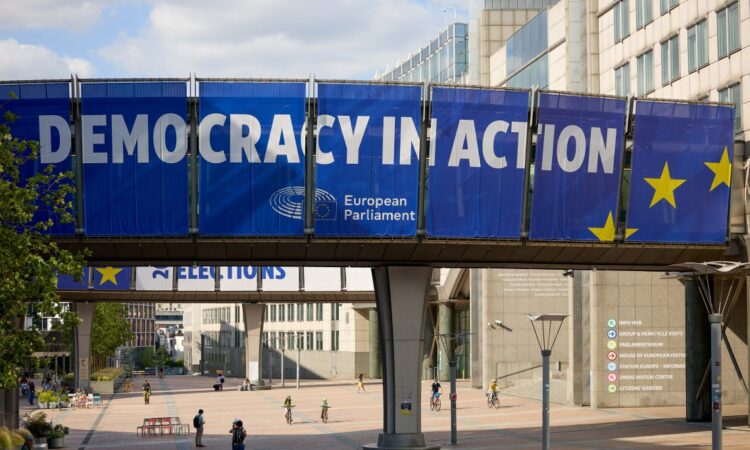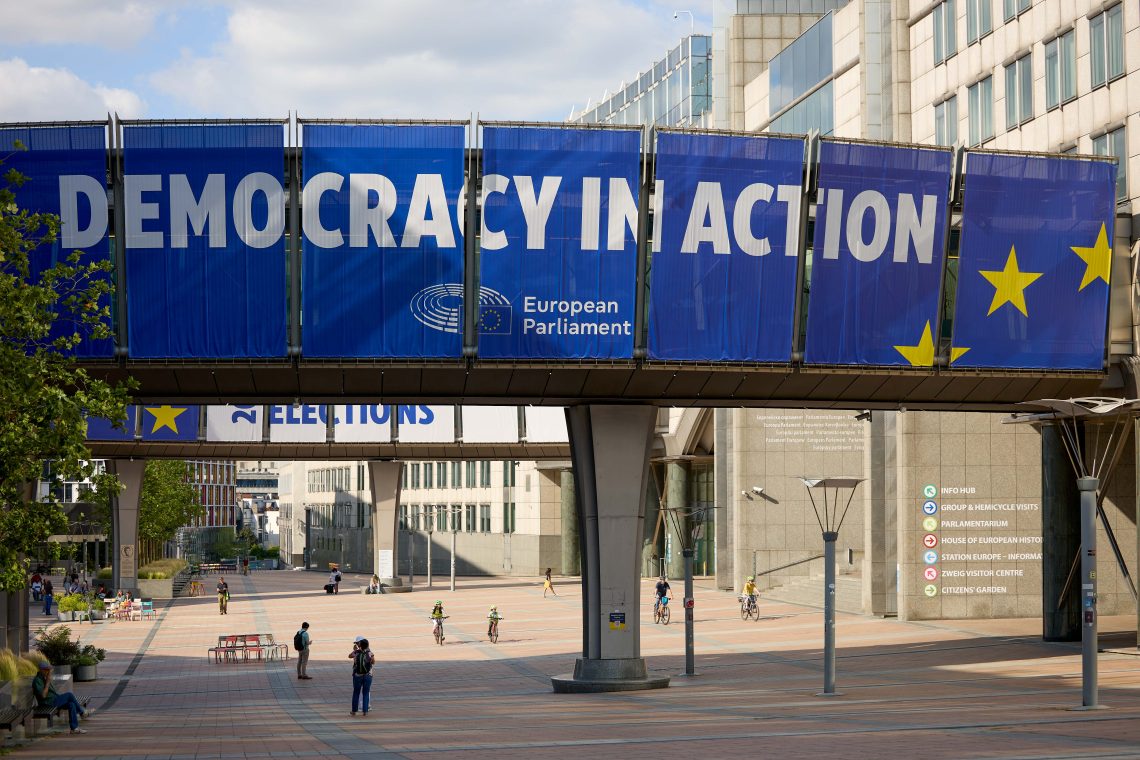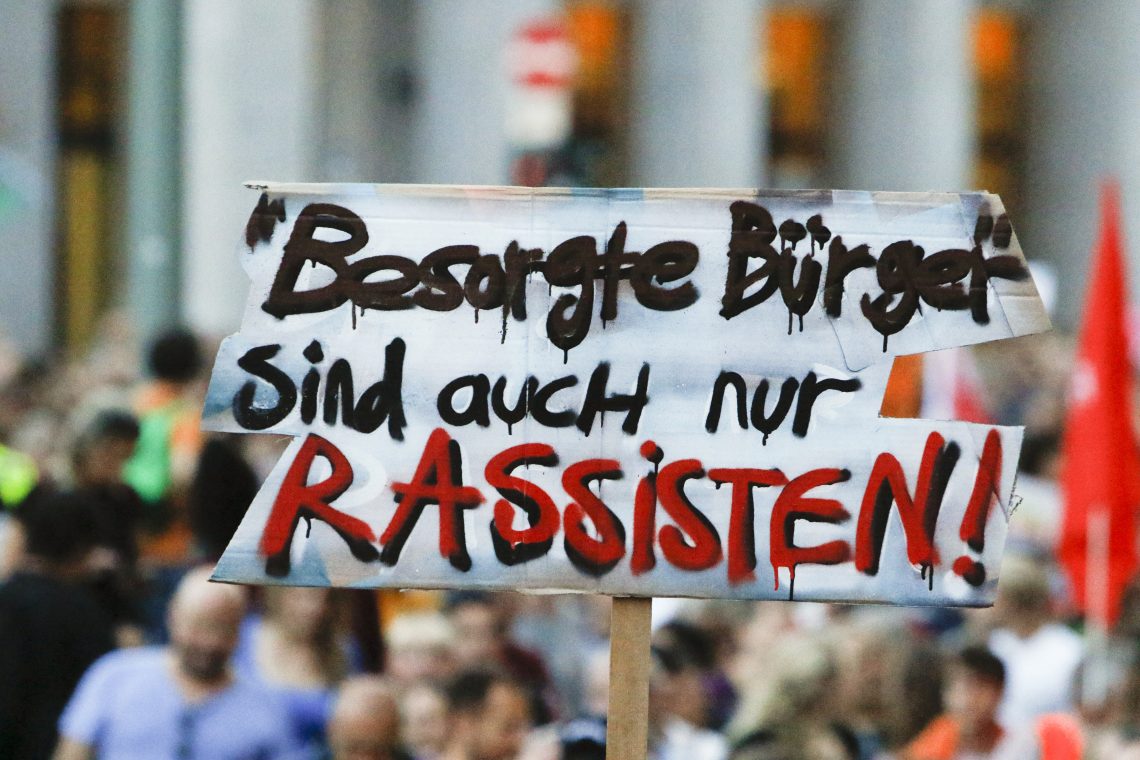
Single-issue parties surged in European Parliament elections, signaling both a shift in the continent’s political dynamics and an opportunity for centrists.

In a nutshell
- European politics are pivoting from left-right lines to single-issue activism
- Migration and climate change drive the rise of fringe parties across Europe
- Polarization and foreign autocrats create challenges for European cohesion
The outcome of the June elections to the European Parliament provides a salient gauge of how the political landscape in Europe is transforming. A common thread in the media narrative is that the European right has won – big – especially in the south. This fails, however, to appreciate how the drivers of the continent’s politics have changed and will continue to develop.
The key takeaway from Europe’s vote is that the traditional lines between left and right are blurring and a fundamentally new order is emerging.
Single-issue activism
The defining feature of this new order is that the ideologies that shaped the old political system are being challenged by single-issue activism. Where parties under the old order could engage in rational bargaining over the costs and benefits of a variety of causes, single-issue activism is different. It is defined by a sole agenda garnering total focus to the detriment of all other issues and by stonewalling any objections. An extreme illustration is the election to the European Parliament of climate activists who advocate for the introduction of dictatorship to save the climate.
The proliferation of fringe parties is the result of traditional parties having failed to deliver what voters want. Characteristically, some of the new parties have been built around charismatic leaders with fuzzy political agendas, from Silvio Berlusconi’s Forza Italia to Emmanuel Macron’s En Marche. Some voters have favored professional comedians, like Beppe Grillo and his Five Star Movement. The January 2024 launch of Germany’s Sahra Wagenknecht Alliance shows how long-standing icons on the left may combine nationalist and leftist rhetoric to improve their political standing. Yet, while such reactions do form an important part of the problem, the root causes run deeper.
Values and polarization
A closer look at the ongoing transformation of European politics shows that the demise of the traditional division of left and right is driven by a confrontation between two very different sets of values. While one side remains beholden to traditional or family values, the other is driven by the emergence of values pertaining to self-realization. The latter emerges from a situation where, already having achieved economic security and social standing, young people who scorn religion instead turn to embrace single-issue activist causes that provide them with a perceived meaning in life.
That is an important part of the reason many affluent young urbanites have embraced various green causes. It is especially paradoxical that they are joining activists who harbor strong aversions to the capitalist system that provided the urbanites with the very economic security needed to champion green issues. This inherent contradiction explains why green parties have such varying track records in different countries.
As the number of people motivated by self-realization values grows, counterreactions follow from those who still embrace traditional values. This not only causes serious disruptions in the pursuit of the daily grind of practical politics, it also drives a wedge between countries in the western and eastern parts of Europe. In cases where there is little room for compromise, such as abortion rights, confrontations can get nasty indeed.
Facts & figures
Characteristics of the European political transformation
- Single-issue focus: There has been a rise of parties dedicated to specific causes, sidelining broader issues.
- Charismatic leaders: New political movements are now often led by notable figures, from comedians to former icons of the left and right.
- Values clash: Increasing polarization between traditional values and modern self-realization ideals is leading to a clash of priorities.
- Fringe impact: Fringe parties and movements are disrupting traditional politics and challenging established parties.
The increasing polarization of the United States illustrates how value-based mobilization has morphed into tribal warfare, pitting the Woke against the MAGA, with scores of other very salient issues falling by the wayside. Given that the American political system is structured in a way that makes it well-nigh impossible for a third party to win congressional representation, these confrontations are played out within the two traditional parties. Europe is different as its parliamentary political systems are generally amenable to the formation of new parties.
The closest European parallel to the U.S. is the United Kingdom, where voting in single-seat constituencies also favors two parties. Although it has been hard for third parties to win representation in the UK, the Liberal Democrats show that it is not impossible. But the recurring story of Nigel Farage – who now claims the West forced Russia to invade Ukraine – drives home how vulnerable the system is. The determined push from him and his erstwhile UK Independence Party on a hot-button issue like Brexit created profound disarray within the Conservative Party, the UK and the European Union. The result for Europe is that single-issue activism will result in the formation of new parties across the political spectrum.
What is behind European political and social developments
The two key drivers behind the ongoing transformation of politics are, first, migration, and then issues linked to climate change, such as energy policy and more recently, Brussels’ attempt to subject farming to regulations aiming to protect the environment – changes that elicited powerful pushbacks across the EU. These drivers of change are different in that while the former (migration) has led to the formation of independent fringe parties, the latter (climate change) has resulted in fringe activist movements capturing parts of the traditional parties. What unites these single-issue groups is that technically available, practical solutions to their problem of choice are blocked by actors with zero interest in compromise and that the long-term consequences of a failure to take remedial action will be quite severe.
Although anti-immigrant sentiment was latent well before the immigration crisis in 2014, the influx of 1.3 million immigrants in that year and the next gave a boost to parties that were already devoted to this cause. It happened across Europe, from the Northern League in Italy and the Front National in France to the Party for Freedom in the Netherlands and the Alternative fur Deutschland (AfD) in Germany. Caught unprepared, the traditional parties caved in to pressure from asylum activists and joined in a broad assault of ostracism and defamation against the surging rivals. The response backfired and raised the standing of leaders like Matteo Salvini, Marine Le Pen and Geert Wilders.
While long-term solutions to a range of problems are theoretically available, they are blocked by single-issue activism.
The debate on climate change is similar in its history. As global warming was growing into a dominant issue, traditional activism against nuclear power intensified following the Fukushima nuclear accident. At the same time, single-issue activists rose to the fore, causing established Green parties to be outflanked by a variety of fringe organizations like Extinction Rebellion, Fridays for Future and Just Stop Oil. As in the case of the migration crisis, the established parties threw in the towel. The peak of this green activism was marked when the teenage Swedish activist Greta Thunberg was invited to speak at the United Nations.
What makes these developments so concerning is not only that they wreak havoc on the pursuit of traditional political business but that the issues that serve as triggers for confrontation are central to the future of Europe. While long-term solutions to a range of problems are theoretically available, they are blocked by single-issue activism.
The flow of migrants into Europe from countries that are culturally very different has given rise to challenges of integration that most European governments have failed to address. That, in turn, has given rise to the emergence of parallel societies that serve as incubators for organized crime and as hotbeds for Islamist radicals.
What Europe could do differently
It has long been known that to be beneficial to the receiving country, immigration must be paired with integration, and migration flows must not result in a lucrative and lethal industry of human trafficking. Yet the main consequence of asylum activism is that those speaking of common sense realities have been silenced, and Europe is now faced with the troubling implications of failing integration. That has helped fringe parties that campaign on anti-immigration agendas.

Similarly, climate change is happening, and remedial action needs to be taken. Although the causes still give rise to debate, the symptoms are indisputable. Rising temperatures and extreme weather incidents are causing damage that ranges from severe drought to catastrophic flooding in areas where such weather events were previously unheard of. The prospect of large parts of Africa being rendered uninhabitable also conjures up visions of a millions-strong arrival of ecological refugees into Europe. Again, there is plenty of understanding of what can and must be done to bring down the overutilization of fossil fuels.
Challenged by violent climate change activism, the mainstream has nonetheless been making strides toward developing technological solutions for a fossil-free future. The impact of activism is that governments are faced with a choice between long-term solutions based on markets and pragmatism, and dogmatic short-term interventions to force people to change their lives. Although the latter can have only a marginal impact, the imperative to “do something” causes a misallocation of resources.
The situation on the EU’s eastern flank
Single-issue activism creates havoc not only within the countries of Western Europe. It also leads to backlash effects in the eastern part of Europe, where traditional values remain strong, and it can serve as a basis for political mobilization. Hungary presents a case in point.
In 1988, Viktor Orban created what was then known as the Alliance of Young Democrats, a liberal activist movement in opposition to Hungary’s Moscow-controlled communist government. Its transformation into what is now a nationalist conservative party called Fidesz was helped by the migration crisis starting in 2014 when Hungary was the only country in Europe to advocate building walls.
Read more from Stefan Hedlund
The response from asylum activists and from governments like that of former German Chancellor Angela Merkel was to heap scorn and venom on Hungary. Today, we are witnessing how badly the attempt at ostracizing Hungary has backfired. Mr. Orban has not only mobilized his country’s electorate around slogans against immigration and LGBTQ rights. His increasingly cordial relations with Russia and China also illustrate another major problem on the new political landscape.
Parties that are created for a single issue become vulnerable to capture both from within, as new members enter to promote their own causes, and from without, as foreign powers exploit the sense of being outsiders. Doing what it does best, the Kremlin has placed a wager on (allegedly) representing family values and being an alternative to the supposed decadence of the West. In its mobilization against “Gayropa,” Russia has won support within EU states from Fidesz and also from Germany’s AfD and other fringe parties that show signs of being captured by Russia.
Scenarios
Possible but not inevitable: Europe’s mainstream collapses
It is easy but shortsighted to view current trends as set in stone, concluding that the European center is collapsing, that an extreme right-wing coalition is emerging and that this will provide fertile ground for Russian influence operations. But things are not bound to end this way.
In the run-up to the European elections, Marine Le Pen aimed an appeal at Italian Prime Minister Giorgia Meloni to join in forming a hard right supergroup. That appeal was largely ignored by Ms. Meloni, who has tentatively sought to move in a center-right direction. However, Ms. Le Pen’s call won the backing of Mr. Orban, who has predicted an end to the liberal order and views himself as a pivotal figure in an illiberal coalition that includes Vladimir Putin, Xi Jinping and Donald Trump.
Possible: Pragmatism prevails
The potential for single-issue extremism to set Europe drifting toward subservience to Moscow and Beijing must certainly not be underestimated. Much damage has already been done. European cohesion will not be easy to restore, and the growing threat from Russia – militarily and in the information sphere – is both clear and ominous.
But there is an alternative scenario, one in which the traditional parties and their electorate find the backbone to deliver, and where the fringe, single-issue parties are deprived of oxygen.
Countries in the Nordic region have experienced the challenges of overwhelming flows of migrants, and they have had their fair share of fringe parties: the Sweden Democrats, the True Finns, the Danish People’s Party and in Norway, the Progress Party. The main difference is that these parties have either been elected into coalition governments or have allied with government, and as a result, they have either fizzled or adapted to the rules. This experience suggests that pragmatism may still prevail in the tug-of-war against extreme activism or that parties dubbed “fringe” by the traditional players will become amenable to easing their more extreme positions once in power.
In the runup to the European elections, Danish Prime Minister Mette Frederiksen, who since 2015 has led the Social Democrats, by far the most successful such party in Europe, said she would be ready to talk to leaders like Prime Minister Meloni. And Ms. Meloni leads a party, the Fratelli d’Italia, that until not long ago, few social democrats in Europe would touch with a ten-foot pole.
Establishing a dialogue between these two leaders would open an avenue for constructive discussions on matters of great urgency, such as migration and European defense. It would also – and more importantly – deflate the notion of the inevitable emergence of a hard-right agenda becoming dominant in Europe. Fringe parties are fringe for a reason, but experience shows that ostracism is not necessarily the best response. In the particular case of Germany, the critical problem is whether it will be able to handle both the AfD and the scandals that have surrounded the transition away from nuclear power. That outlook is rather gloomy.
For industry-specific scenarios and bespoke geopolitical intelligence, contact us and we will provide you with more information about our advisory services.







